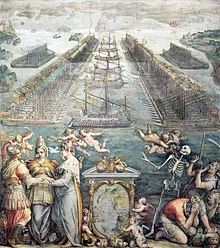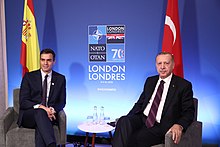
The foreign relations of Spain could be constructed upon the foreign relations of the Hispanic Crown. The personal union of Castile and Aragon that ensued with the joint rule of the Catholic Monarchs was followed by the annexation of the Kingdom of Granada and the Kingdom of Navarre. The crown also built a large colonial empire in the Americas after the arrival of Columbus to the New World in 1492.
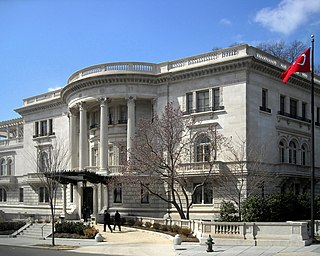
Physically bridging Europe and Asia, Turkey is a secular country that has historically pursued a Western-oriented foreign policy. To this end, Turkey uses its global diplomatic network—the third most extensive—of 252 diplomatic and consular missions.
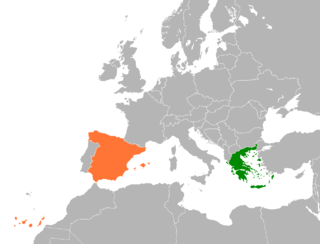
Both Greece and Spain are members of the European Union, NATO, the Organization for Security and Co-operation in Europe, the OECD, the Union for the Mediterranean, and the United Nations.

Relations exist and have existed between Austria and Turkey and their predecessor states, the Habsburg monarchy and Ottoman Empire respectively. The countries fought as allies during the First World War. The countries have since had normal relations, however Austrian opposition to the Accession of Turkey to the European Union has become a point of tension. Both countries are members of the Council of Europe. Austria opposes Turkey's European Union membership. Turkey is a member of NATO. Austria instead is not a member of NATO.

Mexico–Turkey relations are foreign relations between Mexico and Turkey. Both nations are members of the OECD and the United Nations.

Malta–Spain relations are the foreign relations between Malta and Spain. Both countries established mutual diplomatic relations in 1977. Malta has an embassy in Madrid and 5 honorary consulates. Spain has an embassy in Ta' Xbiex and Cultural Centre in Balzan. Both countries are full members of the European Union and of the Union for the Mediterranean. In 2019, both countries celebrated 50 years of relations, highlighting "the strong cultural and historical ties" of both countries and their contribution to the European Union and the Mediterranean.

Romania–Spain relations are the bilateral relations between Romania and the Kingdom of Spain. Both nations are members of the Council of Europe, European Union, NATO and the United Nations. Spain has given full support to Romania's membership in the European Union and NATO.

Hungary–Spain relations are the bilateral relations between Hungary and the Kingdom of Spain. Both nations are members of the Council of Europe, European Union, NATO, OECD and the United Nations.

Brazil–Turkey relations are foreign relations between Brazil and Turkey.
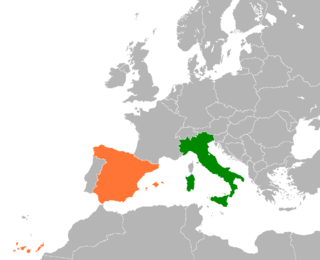
Italy–Spain relations are the interstate relations between Italy and Spain. Both countries established diplomatic relations some time after the unification of Italy in 1860.

Philippines–Spain relations are the relations between the Philippines and Spain. The relations between the two nations span from the 16th century, the Philippines was the lone colony of the Spanish Empire in Asia for more than three centuries. Both nations are members of the Association of Academies of the Spanish Language and the United Nations.

Cuba–Spain relations are the bilateral relations between the Republic of Cuba and the Kingdom of Spain. Relations date back more than five centuries. Cuba had been a colony from 1492 until 1898 when the United States took over the territory in the Spanish–American War. Many Cubans have ancestry dating back from Spain. Many Spaniards escaped the first Spanish Civil War and went to Cuba, and other countries, around 1820–1825.

Colombian-Spain relations are the bilateral relations between the Kingdom of Spain and the Republic of Colombia, formally established in 1881, several decades after Colombia's independence from the Spanish Empire. Both nations are members of the Organization of Ibero-American States and the United Nations.

Spain and Pakistan have diplomatic and bilateral relations.

Mauritania–Spain relations are the foreign relations between Mauritania and Spain. The two nations have had official diplomatic relations since the 1960s. Spain has an embassy in Nouakchott and a consulate-general in Nouadhibou. Mauritania has an embassy in Madrid and a consulate-general in Las Palmas.

Peru and Spain established diplomatic relations in 1879. Both nations are members of the Association of Academies of the Spanish Language, Organization of Ibero-American States, and the United Nations.

El Salvador–Spain relations are the current and historical relations between El Salvador and Spain. Both nations are members of the Association of Academies of the Spanish Language, Organization of Ibero-American States and the United Nations.
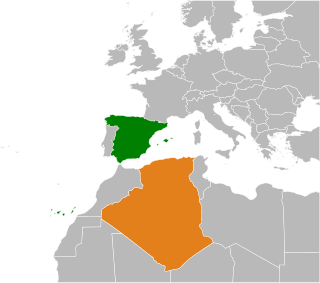
Algeria and Spain are full members of the Union for the Mediterranean.

Slovenia–Spain relations are the bilateral relations between Slovenia and Spain. Slovenia has an embassy in Madrid and three consulates in Barcelona, San Sebastián and Seville. Spain has an embassy in Ljubljana. The Spanish representation in Slovenia is exercised through the Embassy, which has the support of two Aggregators: Defense and Interior; two departments: Tourism and Economy and Commerce, all of them with residence in surrounding countries, although the Economic and Commercial Office has an Antenna in Ljubljana. There is a Cervantes Classroom under the Instituto Cervantes of Vienna. The relations of these two countries are mainly defined by their membership in both the European Union and the NATO.
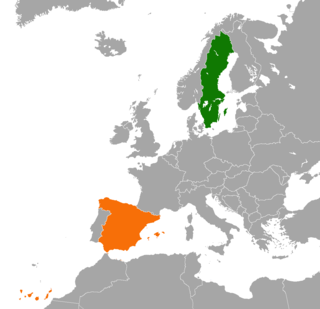
Spain–Sweden relations are the bilateral and diplomatic relations between these two countries. Sweden has an embassy in Madrid, a consulate general in Barcelona and honorary consulates in Bilbao, Cartagena, Gijón, Granada, Jerez de la Frontera, La Coruña, Las Palmas de Gran Canaria, Málaga, Palma de Mallorca, Sevilla, Torrevieja, and Valencia. Spain has an embassy in Stockholm, as well as an Economic and Social Department and another Tourism Department in the same city, and two honorary consulates in Malmö, Helsingborg and Gothenburg. Both countries are full members of Council of Europe, NATO, and of the European Union. Spain strongly supported Sweden's NATO membership during the latter's accession process.

